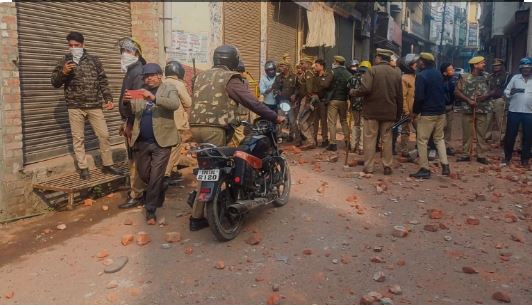Tensions running high in Sambhal City in northern India as violent clashes erupted on Sunday when a court-ordered survey of the 16th-century Shahi Jama Masjid mosque began. Four persons have been reportedly killed and more injured during this unrest, which has prompted local authorities to undertake emergency measures such as internet shutdown and closing down schools.
Survey of Historic Mosque Sparks Violence
The controversy centered around the Shahi Jama Masjid, a federally protected monument, following the local court’s order to video-record a survey of the site. The survey followed a petition filed, claiming that the mosque was built on the ruins of the temple destroyed in the Mughal era in the 16th century.
On Sunday morning, surveyors were scheduled to conduct a court-monitored inspection. With several hundred protesters ready and eager to move toward the mosque, the situation quickly became chaotic, with pitched battles between police and protesters. Videos circulating on social media provide vivid scenes of bricks stones and other debris widely spread around the mosque premises. According to protesters, the violence turned full-scale due to police firing, killing four. However, the police authorities have strongly denied the claims.
“No weapons were used that could take anyone’s life,” Superintendent of Police Krishan Kumar was quoted as saying by The Hindu newspaper in dismissing allegations of wanton violence.
Authorities Turn to Lockdown, Security
In Uttar Pradesh, where Sambhal is located, the authorities registered four separate cases linked to the incident. Internet services in the area were suspended for a while, and the local schools were closed for one day to prevent further unrest. Heavily armed police forces have been deployed to maintain law and order and secure the area around the Shahi Jama Masjid.
Police officials said the situation spiraled out of control when the protesters started pelting stones at the police. The officers had to unleash tear gas and plastic bullets on the rampaging crowds to disperse them and save the survey party.
The top police official, Aunjaneya Kumar Singh, confirmed the force use, saying, “The protesters left us with no choice but to use force to escort the survey team to safety.
Broader Context: Mosque and Temple Conflicts in India
The controversy over the Shahi Jama Masjid is part of a larger narrative of judicial and religious feuds in India. Analogous cases have cropped up over recent years when Hindu organizations alleged that Mughal-era rulers destroyed temples to construct mosques. These claims have sparked legal tussles in courts across the nation, as Muslim groups are defending the historical originality of these mosques.
Tensions in Sambhal have been building up since last Tuesday when the mosque was surveyed for the first time. The Muslim leaders in the area were irate with the court’s sudden move and wondered why the survey was hurried through without adequate notice to the community.
Mahmood Madani, president of Jamiat Ulama-i-Hind, the largest Islamic organization, termed the repeated face-off over mosques as a violation of Indian laws and an attempt to disrupt social harmony.
Political Fallout and Charges of Gunning for Manipulation
The violent incident sparked a political debate, with opposition leaders accusing the Uttar Pradesh government, headed by the Bharatiya Janata Party (BJP), of fueling tensions for political advantage. “It was a calculated move to provoke clashes with Muslims,” opposition leaders say. “The brief survey and high-handed police response were plotted as some electoral favor ahead of coming elections.”.
The state government has definitively denied this. Deputy Chief Minister Brajesh Pathak said that the investigation into the incidents was being carried out, adding, “No one is given a license to take the law in their hands. We will ensure that the law of the land prevails and act against the accused.”
Ongoing Investigation Amid Heightened Security
With the situation in Sambhal still tense, authorities continue to keep the region under close watch. The order given by the court to conduct another survey of the Shahi Jama Masjid has added a layer of uncertainty to the already volatile atmosphere. The local officials assured the public that a thorough investigation was being conducted while promising accountability for the violence.
As India deals with these sensitive religious issues, the Sambhal incident suggests that more broadly it needs to learn to navigate this complex landscape through history and cultures. For now, however, the focus of this incident is on returning peace to the place and ensuring justice after this outbreak of clashes.















